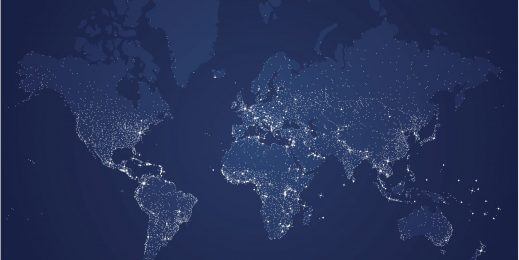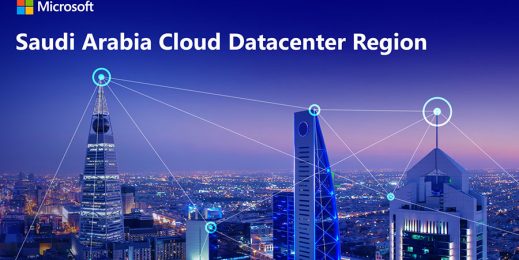
The tech powering the Middle East’s digital transformation
How AI, blockchain & the intelligent cloud are placing the Middle East firmly on the map
Since the start of recorded human history, there have been notable periods of huge technological reinvention. The industrial revolution drove a period of unprecedented manufacturing advancement in the United States of America (USA) and Europe. The “Space Race” saw the USA and the Soviet Union surge forward in the field of space exploration, resulting in man’s first steps on the moon.
The space race also birthed a new generation of scientists, engineers and technology specialists who inspired a wave of technological advancements we’re still using today in areas of communications, navigation, broadcast, flight and weather satellites.
We are all too aware of the fourth industrial revolution currently playing out around us, where technologies like robotics, nanotech, biotech and others are again accelerating the technological innovation curve.
It’s been 70 years since the beginnings of the “Space Race,” and we now find ourselves in a new technological race of sorts, with many of the world’s superpowers forging ahead in the field of Artificial Intelligence (AI). In many ways, the race to advance through AI and machine learning is reminiscent of last century’s space race.
Microsoft recently released a new piece of research surveying business leaders across the world. The study revealed a strong relationship between AI deployment and business growth and found that leaders of the most successful companies see the AI opportunity very differently than their peers do.
The USA and China are early leaders, but several other countries are also competing for talent and technology, and countries in the Middle East count themselves among those close behind.
AI tops the Middle Eastern agenda
The USA and China are investing heavily in AI research and development, while countries like the United Kingdom are looking to become leaders in more niche areas of AI. Other countries like South Korea, France, Germany and others are also becoming increasingly bullish in their AI investments.
With China investing at least $7 billion so far into technology, the country arguably has the most comprehensive national plan to become the AI leader, and China’s AI start-ups received more funding than their American counterparts in 2017. Of the $15.2 billion invested in AI start-ups globally, 48 percent went to China. By 2030, the Chinese government predicts a $150 billion AI industry.
According to data in the Artificial Intelligence Index report, the USA is the clear leader in issuing AI patents, and leads in the number of papers submitted to – and accepted by – major AI conferences.
Given this surging interest across the global landscape, the Middle East, and particularly countries like the UAE and Saudi Arabia, are also pursuing strategies to carve out their own place in the advancement of AI for healthier, happier and more prosperous countries.
PwC’s analysis puts the potential impact of AI for the Middle East at $320 billion by 2030, representing roughly two percent of the global total.
According to His Highness Sheikh Mohammed Bin Rashid Al Maktoum, Vice President and Prime Minister of the UAE, and Ruler of Dubai, “AI is the next major revolution of our time and the UAE’s goal is to become one of the most advanced countries in this regard.”
To compete for a position on the AI podium, the UAE launched its official strategy for AI in 2017, more recently appointing a state minister for artificial intelligence, His Excellency Omar bin Sultan Al Olama. His responsibilities include improving government performance by investing in the latest AI technologies and applying them in various sectors.
Microsoft’s research also found that business leaders across the UAE are highly advanced in terms of their implementation of AI. 53.3 percent indicated that they want to use AI to improve decision making within the next year as opposed to 33.7 percent internationally, and 84 percent think AI is going to have a positive impact on their leadership, which was the highest number in the survey.
The Kingdom of Saudi Arabia is also not standing idle. According to PwC, AI will contribute $135.2 billion to the Saudi Arabian economy by 2030. The Kingdom also recently granted citizenship to an AI-powered robot named Sophia.
Blockchain – A closer look at the Middle East’s ambition to have a blockchain-powered future
Famously known as the underlying technology of cryptocurrencies such as bitcoin, blockchain is anticipated to mature in 2019 and be used across a range of different applications in diverse industries.
Blockchain is an open-source distributed database using state-of-the-art cryptography which facilitates transparency, collaboration and tracking of all kinds of transactions and interactions. The technology is hailed by some as the “new internet” and has the potential to completely revolutionise the world economy.
With blockchain, contracts, agreements, processes and tasks can be created with digital code and saved in transparent, shared databases, where they are safeguarded from deletion or tampering
Contracts, transactions, and the records of them are the backbone of economic, political and legislative structures. Because blockchain has the potential to change business and redefine economies, appetite and support for blockchain is strong in the Middle East, with Dubai again leading the way.
Dubai’s Crown Prince Sheikh Hamdan bin Mohammed Al Maktoum is a major advocate of blockchain and was instrumental in launching the Middle East’s first government-backed blockchain platform, Dubai Blockchain Platform.
The Emirate also aims to have all government documentation, from license renewals and bill payments to digital passports, transacted digitally using blockchain by 2020.
Bahrain’s Institute of Banking and Finance also recently launched its Blockchain Academy, offering courses in blockchain development, implementation and strategy. The establishment of the Blockchain Academy is the country’s first blockchain professional qualification offering and is designed to prepare participants to earn the international qualification of Certified Blockchain Professional.
Developing the skills needed to fill blockchain positions is vital. According to IT ProPortal, 57 percent of large corporations are either actively considering, or are in the process of deploying blockchain technology. However, 94 percent of Fortune 500 executives planning on implementing blockchain projects report that they are concerned about finding the right talent to enable the success of these projects.
Middle East’s largely untapped frontier for intelligent cloud services
Technology such as AI, machine learning or blockchain would not be possible without the power of the cloud. Cloud is the underlying platform with the data storage capacity and massive processing capability to enable AI-powered applications.
The cloud is a key factor in the Middle East’s digital transformation, and the region is worth $2.2 billion to cloud services companies, according to the IDC, with growth predicted at an average of 24 percent a year.
While cloud traffic in the region is dwarfed by activity in North America and Europe – the Middle East and Africa is expected to have the highest cloud traffic growth rate between 2016 and 2021, according to the Global Cloud Index.
Datacentre spending in the Middle East and North Africa will likely hit $5.1 billion by 2020, surpassing 2017 spend by 8.5 percent. Much of this spend will go to supporting smart city initiatives core to the region’s ambitions.
Global tech players like Microsoft have recognised the massive potential and growth of cloud services in the region. Following the opening of Africa’s first hyper-scale data centres in March this year, Microsoft will also be opening datacentre regions in Abu Dhabi and Dubai, helping companies in the Middle East securely and reliably move their businesses to the cloud while meeting compliance needs. This marks the second datacentre expansion for Microsoft in the Middle East and Africa in less than a year.
In a piece for the The National newspaper, IDC analyst Megha Kumar said, “The region is one of the fastest-growing public cloud services markets, and the potential is huge given the ambitions of the public sector and their drive for innovation.”
“We see enormous opportunity in the region for cloud technology to be the key driver of economic development, while providing sustainable solutions to many pressing issues such as youth employability, skills development, education and healthcare,” commented Jaime Galviz, COO and CMO at Microsoft Middle East and Africa.
Tempering ambition with a healthy dose of pragmatism
A key factor for the Middle East, or any region looking to take advantage of the coming AI revolution, is the shortage of skilled people to fill the growing number of cloud, AI or blockchain-based jobs.
Open positions in these areas are growing faster than they can be filled, with research from IDC and Microsoft showing that cloud computing could potentially generate more than half a million jobs across key markets in the Middle East and Africa between 2017 and 2022. These positions are not confined to IT companies either, with new careers across marketing, sales, finance and administration, production and service.
The region needs to address the cloud skills gap. Therefore, initiatives like Microsoft Cloud Society exist. Cloud Society offers training, certification opportunities and face-to-face engagements with Microsoft cloud experts. In this way, those already in technical fields can learn with the future in mind – and adopt a culture of lifelong learning.
In just over a year, Cloud Society reached over 100,000 members in the Middle East and Africa, revolutionising the way Microsoft approaches skills building.
The programme also contains various modules on AI where members can explore topics such as machine learning, computer vision, image analysis, and many more. This learning path provides members with the skills they will need to contribute to a better, smarter tomorrow.
Microsoft also recently launched the AI Business School, an online master class series designed to empower business leaders with insights and learnings needed to be successful in creating an AI strategy and fostering an AI ready culture.
The AI Business School is available online, at no cost, in an easy-to-consume, on-demand format so business leaders can access the content at their own pace and based on their key focus areas.
Moving forward
The region’s growth, driven by digital transformation, cloud, blockchain, as well as increasing adoption of AI and automation, is bringing about major shifts to societies and economies.
It’s clear that nations like the UAE, Saudi Arabia and Bahrain are eager to embrace this growth and disruption, and they are taking bold steps to achieve a new vision and global standing for their countries. But the transition to this new digital, AI-enabled reality can’t be haphazard. It needs to be supported with solid policy-frameworks, healthy investments and structural shifts that ensure these economies remain competitive and on track as the next generation of technology enters the fold.












![A security team analyses key data from a visual dashboard.]](https://news.microsoft.com/wp-content/uploads/prod/sites/133/2023/04/Security-Sprint_TL_Banner-Image-519x260.jpg)



